Pre-employment screening helps companies find the best candidates for their open positions. It gives recruiters objective data to evaluate applicants' skills and potential fit.
This guide compares Adaface and Pymetrics to help you choose the right assessment tool for your hiring needs. We'll look at key features, strengths, and differences between these two platforms.
Explore this post with:
Table of contents
How does Adaface work?
Adaface is a modern pre-employment assessment platform designed to help companies screen candidates effectively. With a robust library of tests, it covers everything from programming to language proficiency.
Recruiters use Adaface primarily for its customized assessments. The platform generates tests tailored to specific job descriptions, ensuring a perfect match between the role and the candidate's skills.
Another reason recruiters love Adaface is its conversational interface. This feature makes tests feel more like an engaging chat, vastly improving candidate experience and reducing drop-off rates.
Adaface also offers advanced proctoring features, such as webcam proctoring and location logging, to ensure the integrity of the assessments. Additionally, integrations with popular ATS systems streamline the recruitment process. Explore Adaface's features for more details.
How does Pymetrics work?
Pymetrics uses neuroscience-based games and AI to evaluate candidates' cognitive abilities, emotional traits, and social intelligence. This approach aims to match candidates with roles that suit their innate characteristics.
Candidates play a series of short games designed to assess attributes like attention, memory, and risk tolerance. Based on their performance, an algorithm generates a profile to match them with suitable job roles.
One standout feature of Pymetrics is its focus on removing biases by comparing candidates to a company's top performers rather than a generic standard. This can help to create a more diverse and inclusive workforce.
However, Pymetrics lacks several common assessment types, such as coding tests, language proficiency tests, and business skills assessments. This can be a limitation for companies looking for a more comprehensive evaluation of their candidates.
Adaface vs Pymetrics: Test libraries
Both Adaface and Pymetrics offer diverse test libraries tailored for pre-employment assessments. Adaface covers a wide range of skills including technical, business, and language, while Pymetrics focuses mainly on aptitude and personality tests.
Recruiters can leverage these test libraries to evaluate candidates' fit even before the interview stage, thereby streamlining the hiring process. Choosing the right test library can greatly impact the accuracy and relevance of candidate evaluations.
Adaface's test library
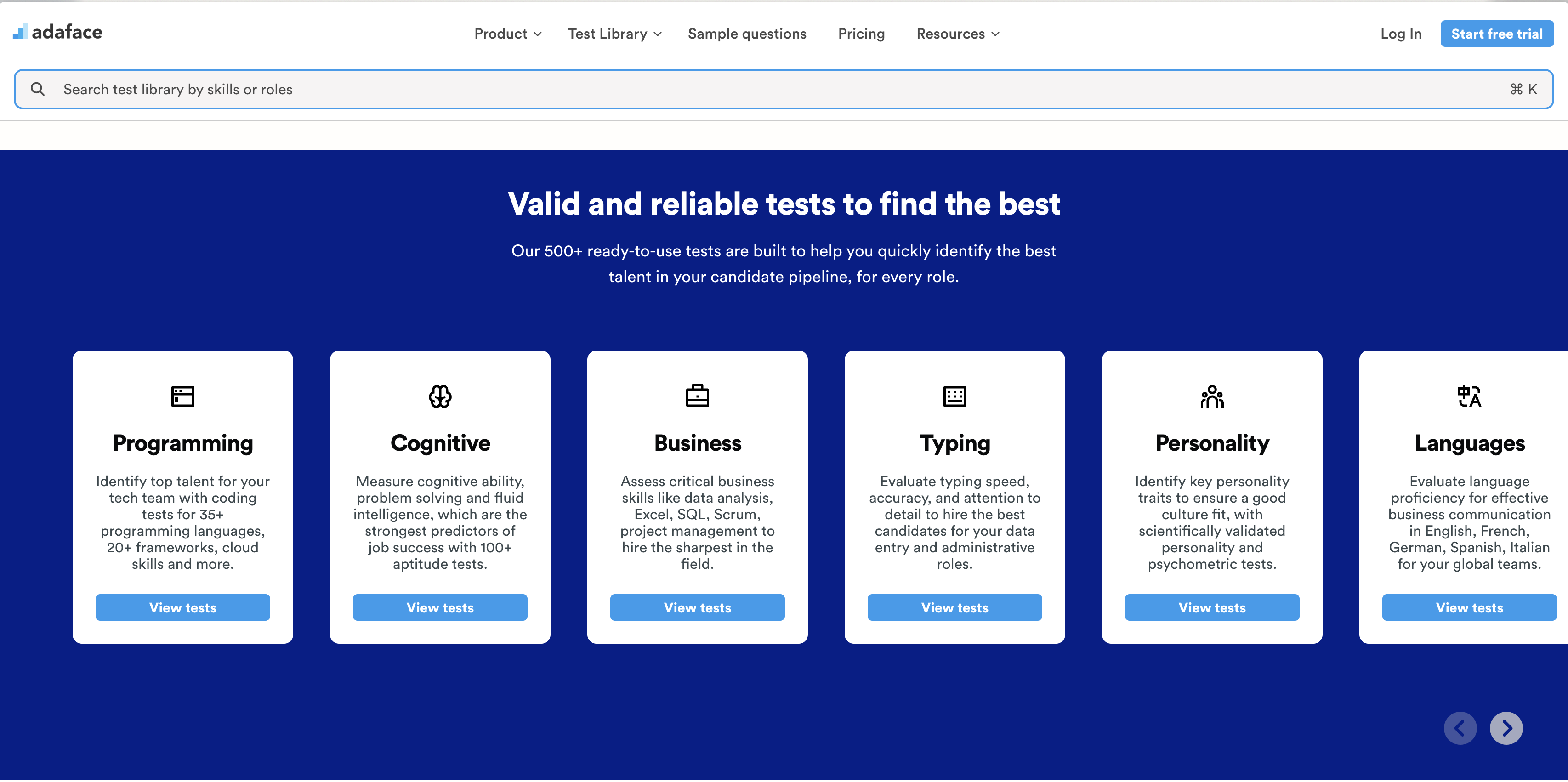
Adaface's test library includes a vast array of tests, covering multiple domains such as technical skills, programming, business, and finance. Not only that, but it also provides custom questions, language proficiency tests, and scenarios specific to job roles.
Recruiters use Adaface's test library for its versatility and customizability, allowing them to create highly relevant assessments tailored to specific job descriptions. This ensures that candidates are evaluated on skills that matter most for the role.
To see Adaface's test library in action, you can explore pre-employment IT tests, role-specific tests, artificial intelligence tests, and many more. Whether it's a ready-to-use test or a custom assessment, Adaface provides a comprehensive solution tailored to your hiring needs.
Pymetrics's test library
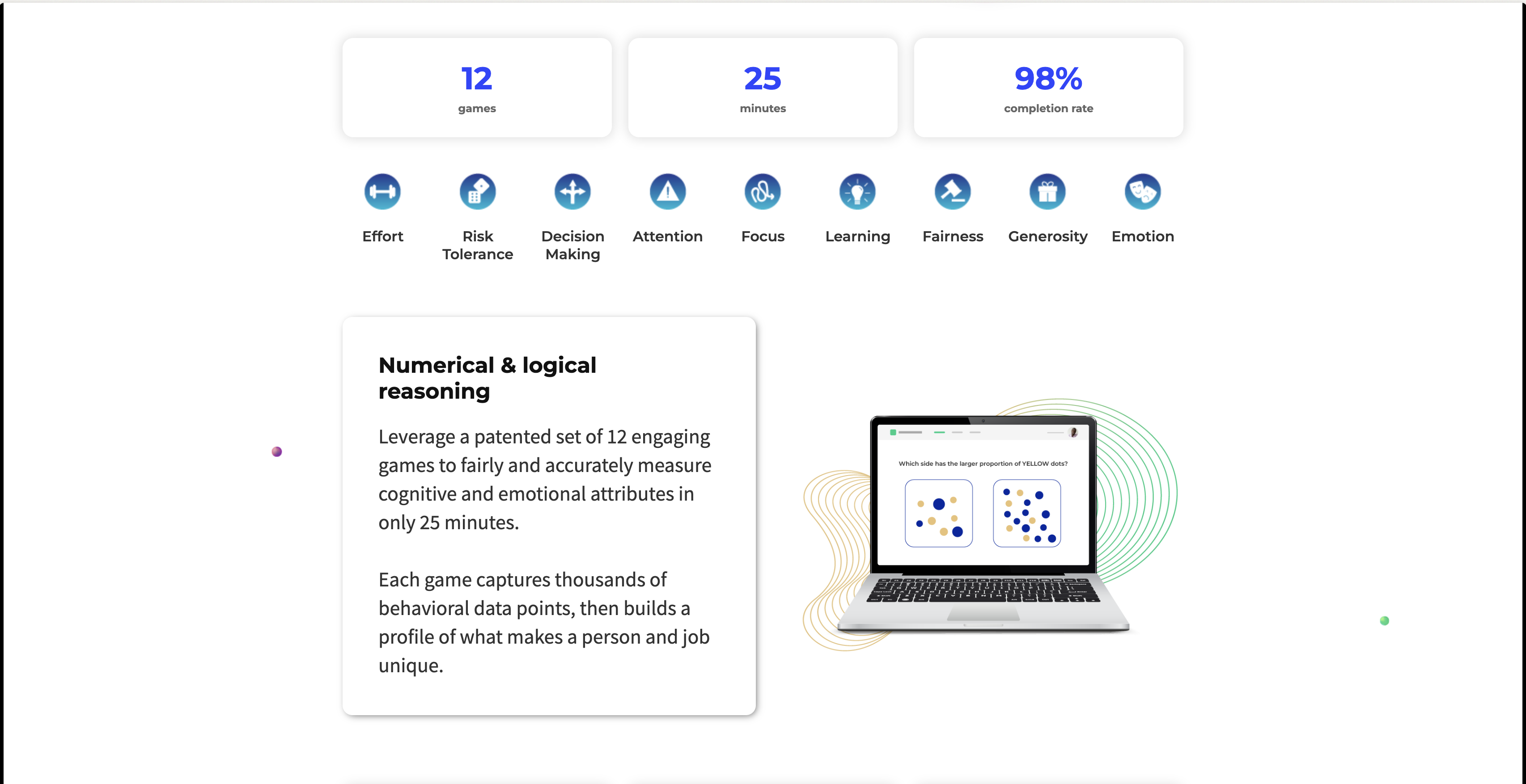
Pymetrics offers a test library that primarily focuses on cognitive and personality assessments. Their tests are rooted in neuroscience and measure traits like attention, memory, and emotional intelligence.
These assessments are particularly useful for roles where cognitive skills and personality fit are crucial, such as in leadership or team-based environments. They aim to predict candidate success by analyzing inherent traits.
However, Pymetrics's test library lacks coverage for job-specific skills, programming, situational judgment, and language tests. There's also no option for custom questions or test customization based on specific job descriptions.
Comparison of test libraries
Adaface vs Pymetrics: Business, Marketing and Ops Roles
When sifting through a mountain of resumes, recruiters need a trusty sieve to filter out the nuggets of talent. Enter skills assessments—designed to identify candidates with the exact chops needed for the job.
Both Adaface and Pymetrics offer assessments to screen on-the-job skills. While Adaface provides a tailored approach with a large variety of tests, Pymetrics focuses on behavioral assessments with a sprinkle of aptitude tests.
Business, Marketing and Ops Roles with Adaface
Adaface brings to the table a diverse array of functionalities designed to screen role-specific skills:
- Over 500 tests including programming, business, and language proficiency
- Support for creating custom questions and tests based on job descriptions
- Scenario-based questions for practical assessment
Recruiters love Adaface because it allows them to precisely evaluate candidates' role-specific skills, like using a Microsoft Excel Test to gauge spreadsheet savvy or a Vue.js Developer Test for frontend roles.
Beyond just tests, Adaface offers a user-friendly platform where recruiters can easily design and customize assessments, making it a breeze to match the perfect candidate to the role at hand.
Hiring Business, Marketing and Ops Roles with Pymetrics
Pymetrics offers assessments primarily focused on soft skills and cognitive abilities, which can be useful for various non-developer roles. They utilize behavioral science to evaluate candidates, relying heavily on their engaging game-based assessments that provide insights into personality traits and aptitudes.
Their test library is designed to cover a range of non-dev roles, making it suitable for positions that require strong interpersonal and decision-making skills. For instance, Pymetrics can help identify suitable candidates for sales or customer service roles by assessing how they align with the desired traits for these positions.
However, Pymetrics lacks a variety of role-specific skills tests that truly reflect the practical requirements of different jobs. For example, they don't offer assessments tailored to specific business skills or provide customizable tests based on job descriptions, which can leave gaps in evaluating candidates for more specialized non-dev roles.
Adaface vs Pymetrics: Developer hiring
Hiring developers can be tricky, as they need a wide range of skills to excel. That's why recruiters use tests to screen candidates and assess their coding abilities, problem-solving skills, and technical knowledge.
Both Adaface and Pymetrics offer assessment tools for hiring developers. However, Adaface provides a more tech-focused approach with coding questions and hands-on challenges, while Pymetrics focuses on soft skills and cognitive abilities.
Hiring developers with Adaface
Adaface's developer hiring toolkit includes:
- Programming language tests (e.g., Java, Python)
- Web and mobile framework assessments
- Data structures and algorithms challenges
- SQL coding questions
- Excel workbook simulations
Recruiters use Adaface to hire developers because it offers a mix of multiple-choice questions and coding challenges. This approach helps assess both theoretical knowledge and practical skills, giving a well-rounded view of a candidate's abilities.
Adaface also provides features like code playback and automated scoring, making it easier for hiring managers to evaluate candidates. Plus, recruiters can add custom coding questions to tailor assessments to their specific needs.
Hiring developers with Pymetrics
Pymetrics doesn't offer specialized programming assessments for hiring developers. Their platform primarily focuses on assessing soft skills through neuroscience-based games and AI-driven data analysis.
While Pymetrics excels at evaluating cognitive and emotional attributes, it lacks a library of technical tests essential for technical developer roles. This can be beneficial for roles where behavioral traits are prioritized.
However, without coding questions, web, mobile, or data structure frameworks, and automated scoring, Pymetrics might not be the go-to for thorough developer skill assessments.
Comparison of developer hiring features
Adaface vs Pymetrics: Candidate experience and company branding
Candidate experience shapes how job seekers view your company. A poor experience can lead to abandoned applications and damage to your employer brand.
Key factors that impact candidate experience include test length, mobile-friendliness, and company branding. Shorter tests, device flexibility, and custom branding help keep candidates engaged throughout the process.
Candidate experience and company branding with Adaface
Adaface offers a conversational interface that feels more like a chat than a test. This friendly approach helps candidates relax and perform their best.
The platform supports mobile devices, allowing candidates to complete assessments on their preferred device. With typical test lengths of 40 minutes, Adaface balances thoroughness with candidate convenience.
Adaface lets you add your company logo, colors, and custom email templates. This consistent branding reinforces your professional image and shows candidates you value their time and effort.
Candidate experience and company branding with Pymetrics
Pymetrics offers a unique candidate experience with its game-based assessments. These tests typically take about 30 minutes to complete and are mobile-friendly, allowing candidates to take them on any device. Pymetrics provides email support for candidates who encounter issues or have questions during the assessment process.
When it comes to company branding, Pymetrics seems to have limited options. The platform doesn't appear to offer customization for company logos, brand colors, or invitation templates. This means that the assessment experience may not fully align with a company's visual identity or messaging.
While Pymetrics' game-based approach can be engaging, some candidates might prefer a more traditional assessment format. Additionally, the lack of qualifying questions at the start of the assessment could lead to candidates spending time on tests they're not suitable for. A platform with more flexible branding options and customizable communication templates could potentially offer a more tailored experience for both candidates and employers.
Adaface vs Pymetrics: Anti-cheating features
Cheating during pre-employment tests can undermine the assessment's integrity and provide an unfair advantage to certain candidates. An ideal assessment platform should have robust anti-cheating measures to ensure a level playing field and accurate results.
Anti-cheating features of Adaface
Adaface takes a comprehensive approach to prevent cheating during assessments. Here are some of its key anti-cheating features:
- User authentication: Candidates must authenticate themselves before starting the test, ensuring only the intended person takes the assessment.
- Time limits: Tests have time restrictions at the question level, making cheating more challenging and ensuring score accuracy.
- Web and webcam proctoring: Adaface tracks browser activity and records video footage of candidates during the test, deterring potential cheating behavior.
- Location and IP tracking: The platform logs candidates' locations and IP addresses, flagging any suspicious activity.
- Device fingerprinting: Adaface can identify if multiple candidates are using the same device for the assessment.
- Copy-paste protection: The platform disables copy-paste functionality during tests, preventing candidates from sharing questions or answers.
- Full-screen mode: Recruiters can require candidates to take the test in full-screen mode, minimizing the risk of them accessing other windows or resources.
Furthermore, Adaface employs measures like plagiarism detection for coding assignments, a large question bank of over 20,000 items to minimize question exposure, and social media monitoring to identify potential question leaks. These robust anti-cheating features ensure the integrity of Adaface's assessments, providing reliable and accurate results for informed hiring decisions.
Anti-cheating features of Pymetrics
Pymetrics takes a unique approach to anti-cheating. Their gamified assessments measure cognitive and emotional traits, which are harder to fake than traditional skill-based tests. They use time limits on tests and require user authentication before starting.
This approach aims to create a more cheat-resistant environment. By focusing on inherent traits rather than learned skills, Pymetrics tries to minimize the incentive and ability to cheat during assessments.
However, Pymetrics lacks some common proctoring features. They don't use webcam monitoring, IP tracking, or browser tab tracking. There's also no mention of protection against AI tools like ChatGPT or measures to prevent screen sharing.
Comparison of anti-cheating features
Adaface vs Pymetrics: Pricing and free trial
When it comes to pre-employment assessment tools, pricing can be a make-or-break factor for many recruiters. It's not just about the cost, but also about the value you get for your money. Let's take a closer look at how we at Adaface approach pricing.
Adaface pricing
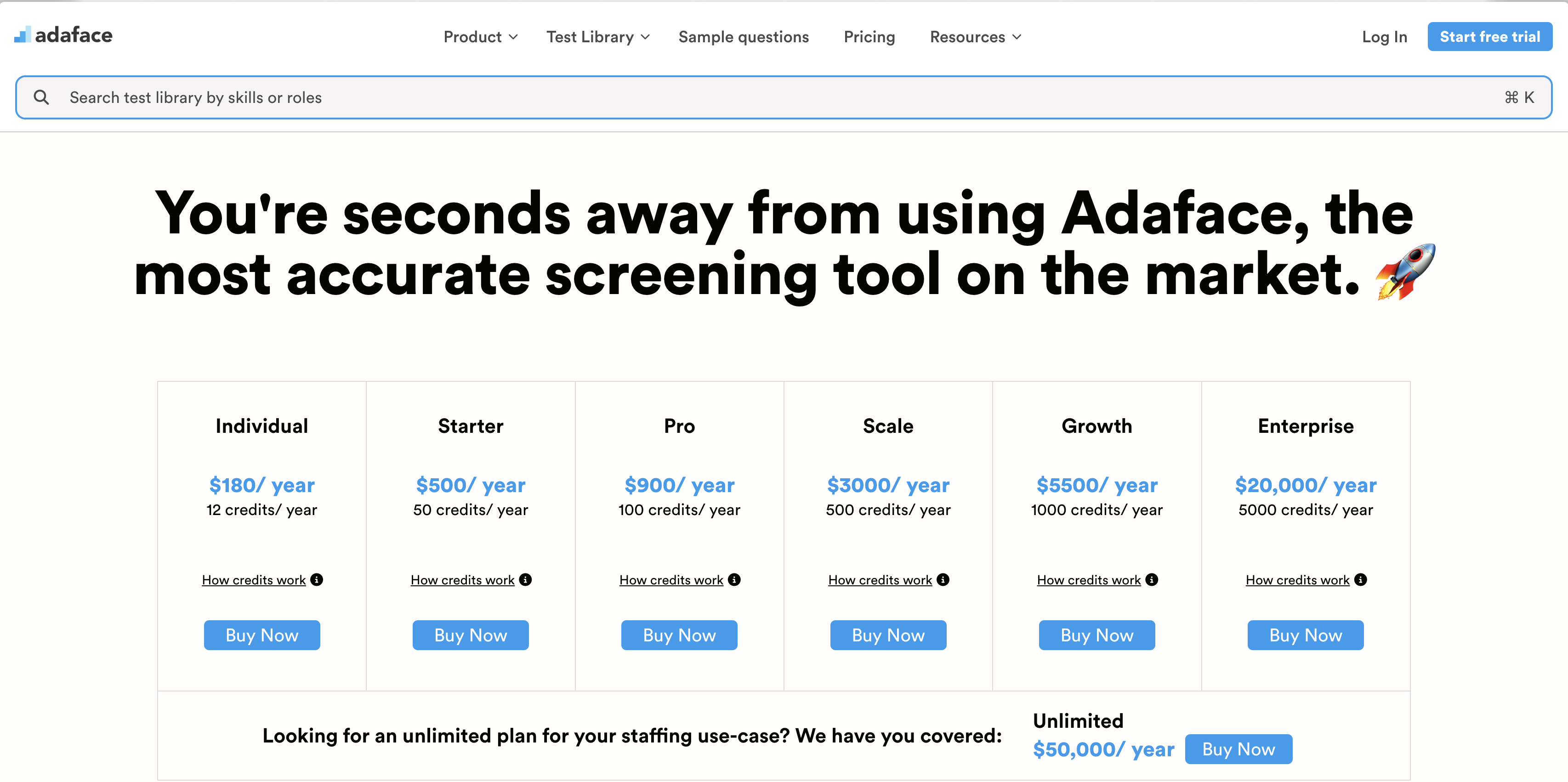
At Adaface, we believe in transparent and flexible pricing. Our pricing page lays out all the details, so you know exactly what you're getting. We offer a range of plans to suit different hiring needs and budgets.
Our plans include:
- Starter: $500 for 50 credits
- Scale: $3000 for 500 credits
- Growth: $5500 for 1000 credits
- Enterprise: $20,000 for 4000 credits
- Unlimited: $50,000 per year for unlimited assessments
We also offer a free trial, so you can explore all our features before making a decision. This hands-on experience helps you understand how our platform can fit into your hiring process. Whether you're a small startup or a large corporation, we've got a plan that's just right for you.
Pymetrics pricing
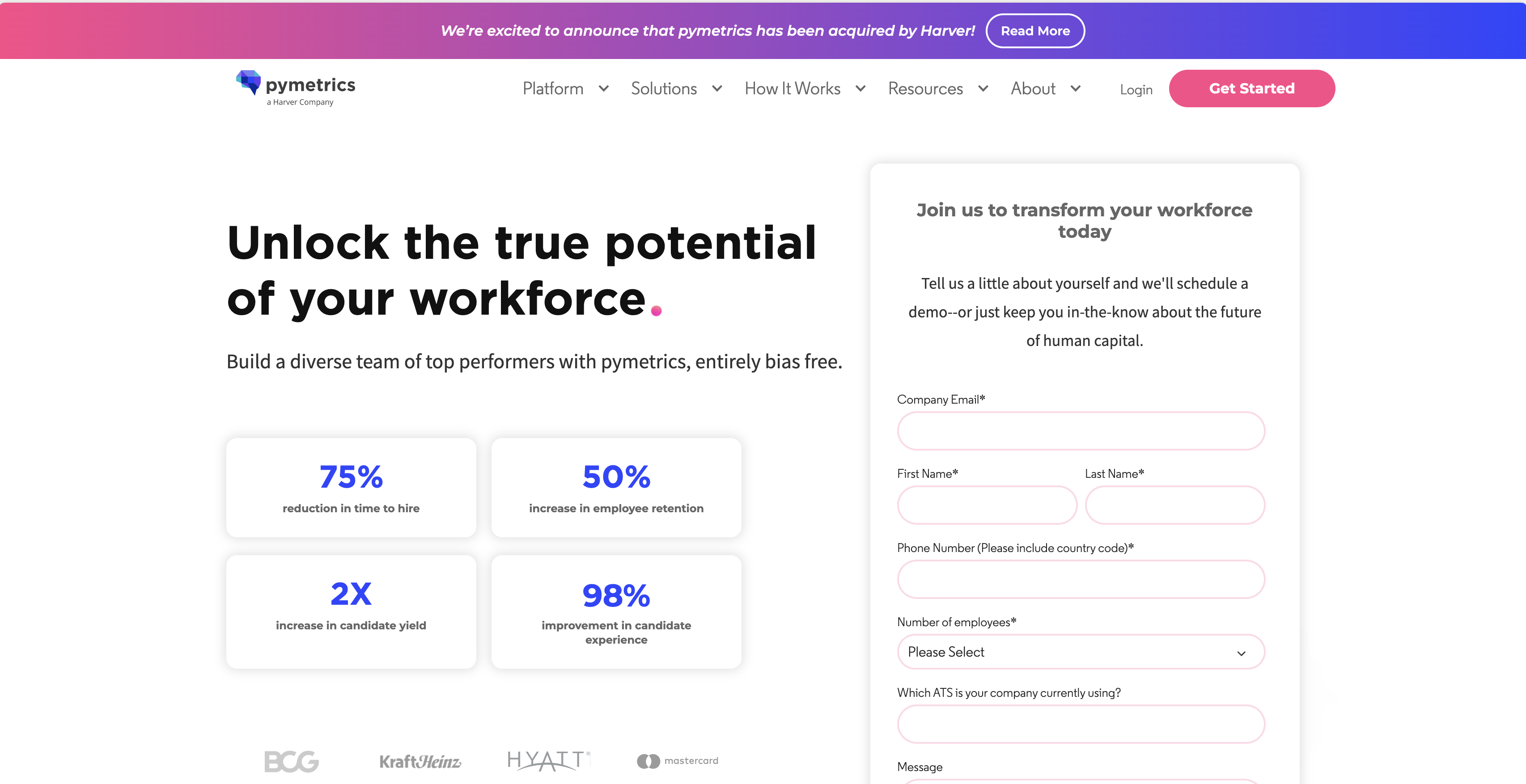
Pymetrics keeps its pricing under wraps, so if you're curious about how much it'll set you back, you'll need to contact their sales team directly. They don't provide a clear breakdown of their plans or pricing tiers on their website, which can make it a bit challenging to get a quick sense of cost. Transparency in pricing is not their strong suit, so you should be prepared for some back-and-forth communication to get the information you need.
The lack of publicly available pricing information means you can't easily compare Pymetrics to other platforms without reaching out to their team. Moreover, they don't offer a free trial, making it harder for recruiters to explore the platform before committing. This could lead to a longer decision-making process, as potential users can't sign up on their own to explore all features and see if it meets their needs.
Comparison of pricing
Adaface vs Pymetrics: Scorecards, reporting and analytics
In today's fast-paced hiring world, recruiters need tools that give them quick insights into candidate performance. Good scorecards, reporting and analytics features help hiring teams make informed decisions by presenting test results in an easy-to-understand format. These features should allow for easy sharing of reports and provide a clear picture of how candidates stack up against each other.
Adaface scorecards, reporting and analytics
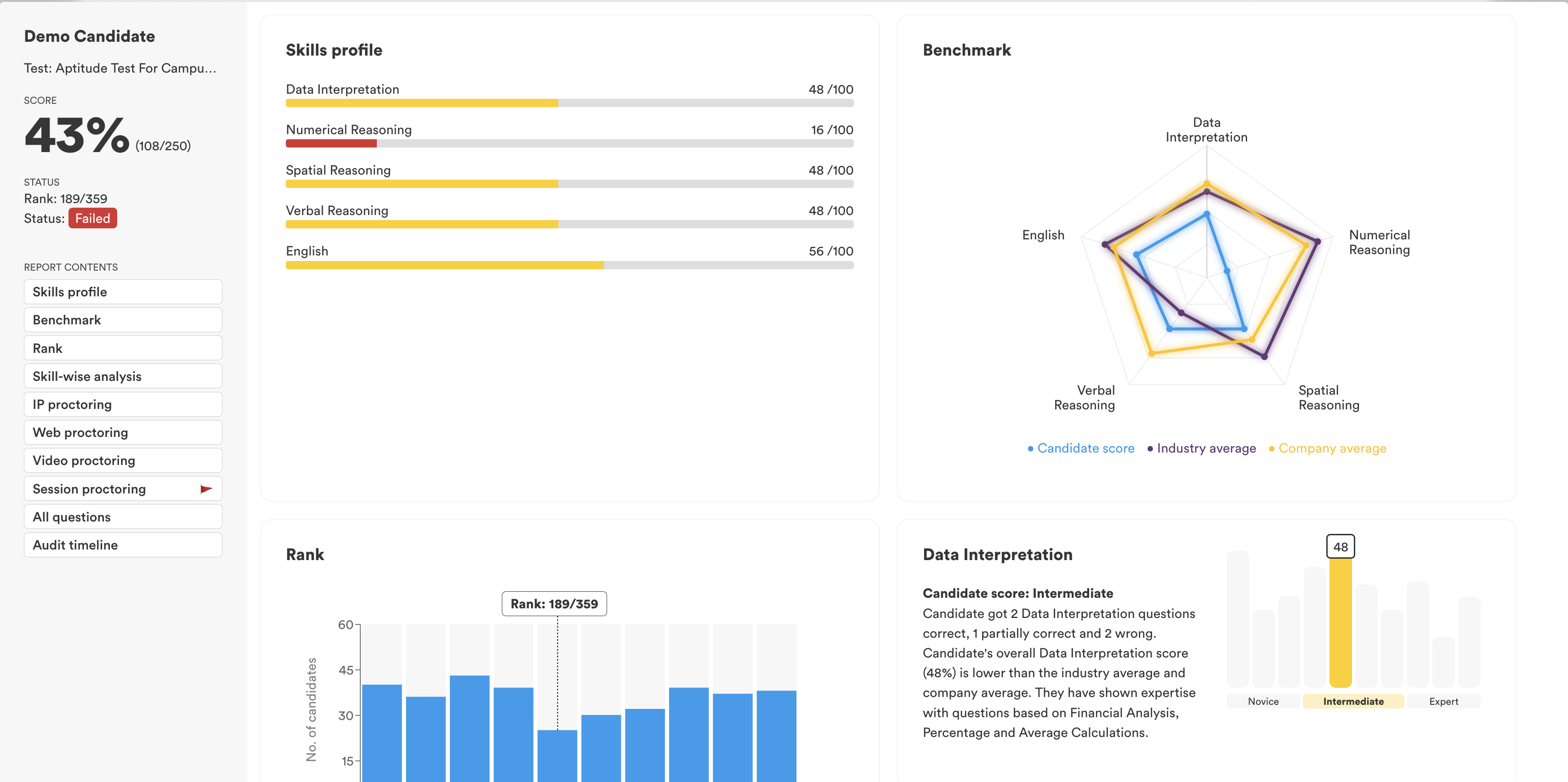
Adaface offers a range of powerful reporting tools to help recruiters evaluate candidates effectively. The platform generates detailed PDF reports that can be easily shared with team members or clients. For added flexibility, Adaface provides public report links, allowing external stakeholders to view scorecards without logging in.
Adaface's scorecards include a skills profile, giving recruiters a quick snapshot of a candidate's performance across multiple skills. The platform also offers skill-wise analysis, breaking down scores by different categories and highlighting areas where candidates excelled or struggled. This detailed information helps recruiters make informed decisions about moving candidates to the next round of interviews.
Pymetrics scorecards, reporting and analytics
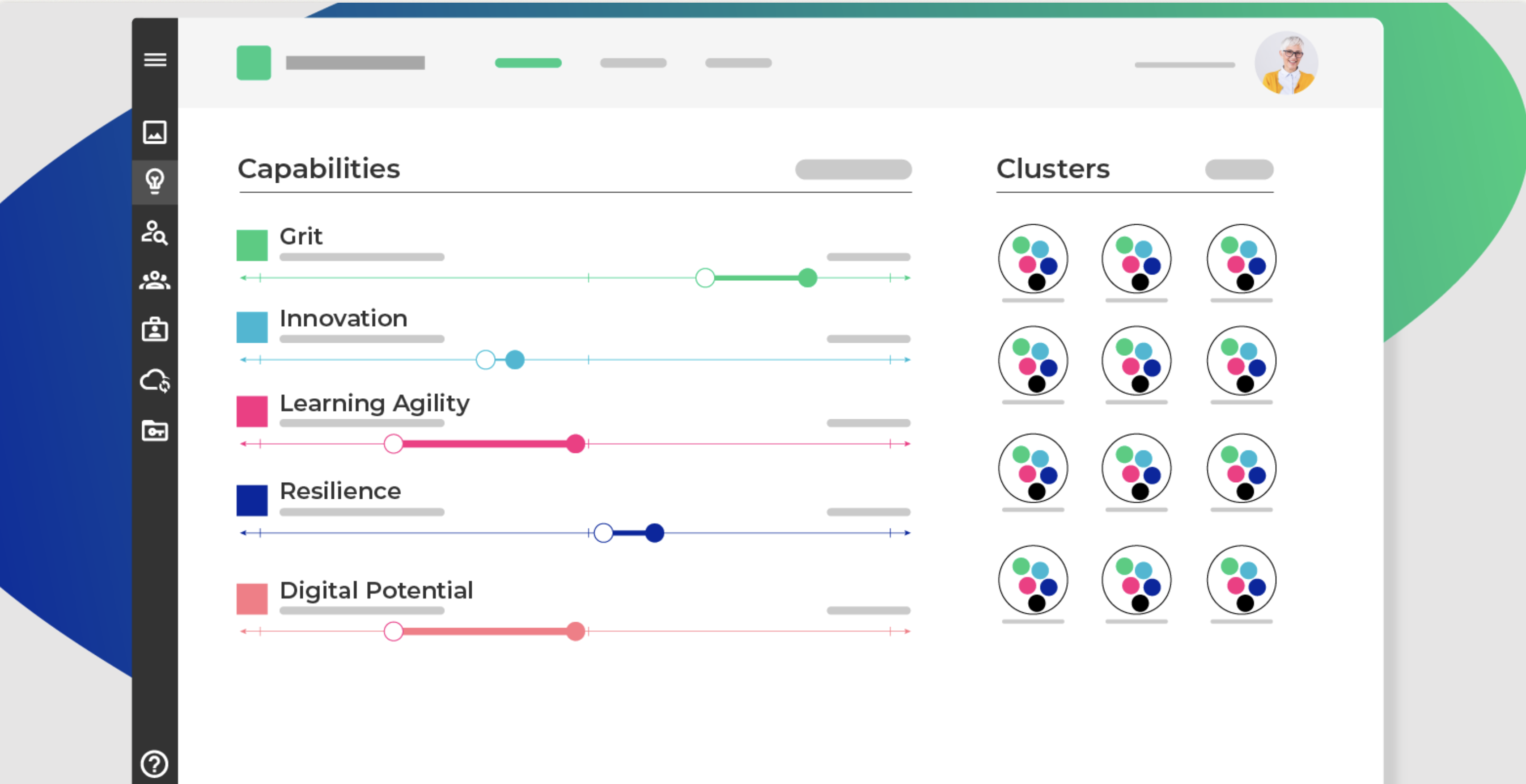
Pymetrics offers PDF reports that present an overview of each candidate's performance, focusing on their cognitive and emotional traits. The platform generates automated scorecards complete with benchmarking, allowing recruiters to compare candidates against each other.
A use case for Pymetrics' reporting features is that hiring managers can quickly identify top talent based on emotional intelligence and problem-solving skills. However, the lack of more detailed skill-specific analysis might leave recruiters wanting a more granular view.
Additionally, Pymetrics does not offer public report links, Excel/CSV exports, or audit timelines, potentially limiting the flexibility and depth of candidate evaluations for recruiters.
Comparison of scorecards, reporting and analytics
Adaface vs Pymetrics: Enterprise and startup friendliness
When choosing a skills assessment platform, look for features that work for companies of all sizes. Key things to consider are ATS integration, GDPR compliance, and API access.
Adaface's enterprise and startup friendliness
Adaface offers enterprise-grade features across all plans. This includes ATS integrations, GDPR compliance, and a custom API. These allow seamless workflow integration for companies big and small.
For scaling your hiring, Adaface provides unlimited team seats, multiple invite options, and bulk actions. These features make managing high-volume recruiting easier, whether you're a startup or large corporation.
Adaface also caters to specific enterprise needs. It offers role-based access controls, priority support, and custom data location options. Plus, multiple question sets help maintain assessment integrity for ongoing hiring.
Pymetrics's enterprise and startup friendliness
Pymetrics offers ATS integrations, GDPR compliance, and a custom API, making it a suitable choice for both enterprises and startups. These features allow organizations to seamlessly integrate the platform into their existing HR systems.
Enterprises can benefit from Pymetrics' workforce analytics, which can help in making data-driven hiring decisions. Startups might find value in its neuroscience-based assessments to identify top talent.
However, Pymetrics does not offer role-based access or bulk actions, which can be limiting for larger teams. Additionally, priority support and multiple invite options are not available, which could impact recruitment efficiency.
Comparison of enterprise and startup friendliness
Adaface vs Pymetrics: Assessment quality control
When it comes to assessments, quality control ensures that the tests measure what they’re supposed to and provide reliable results. For recruiters, this means making confident hiring decisions based on valid data.
Adaface's quality control features
Adaface employs rigorous quality control features, including a stringent vetting process for every question before it goes live. This means only the best and most relevant questions make it to candidates.
Feedback from candidates plays a significant role in maintaining quality. Adaface actively gathers this feedback to refine and enhance test content, ensuring they remain effective and up-to-date.
Additionally, Adaface utilizes proprietary algorithms to evaluate the quality of questions, helping to identify and replace any that may have been overused. Recruiters can trust that the assessments they use will provide an accurate reflection of candidates' abilities. For more information on our quality measures, check out the science behind Adaface tests.
Pymetrics's quality control features
Pymetrics has a quality control process in place to ensure their assessments are accurate and fair. They use candidate feedback to improve their tests, which helps keep the content relevant and user-friendly.
The company employs psychometric test theory to measure behavior and personality traits. This approach means every candidate takes the same standardized assessment, which can help with consistency in results.
However, it's unclear how often Pymetrics reviews its assessment or updates questions. There's also no information about proprietary algorithms to improve question quality or systems to replace overused questions.
Comparison of quality control
Adaface vs Pymetrics: Customer support
Customer support in pre-employment assessment platforms can make or break your hiring process. Good support ensures you can use all features effectively and resolve issues quickly, keeping your recruitment on track.
Adaface's customer support features
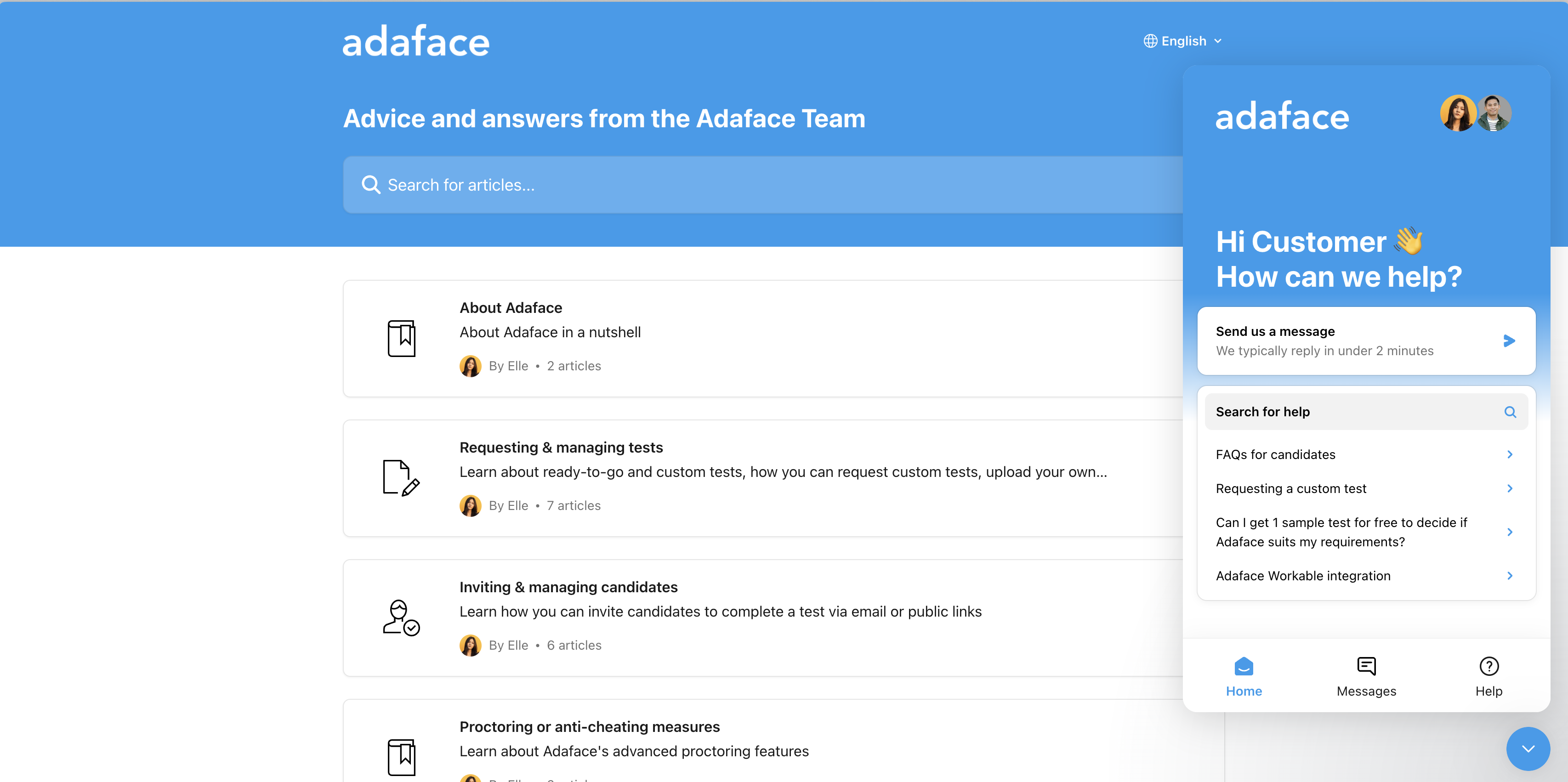
At Adaface, we offer multiple support channels to meet your needs. Our team is available via email and live chat, providing quick responses to your questions.
We also have a detailed help center with guides and FAQs. This resource covers everything from creating assessments to interpreting results, helping you make the most of our platform.
For enterprise clients, we offer dedicated priority support. This includes personalized onboarding and training sessions to help your team master the Adaface platform and optimize your hiring process.
Pymetrics's customer support features
Pymetrics offers email support for users to reach out with questions or issues. They have a basic online presence for customer assistance.
However, the platform lacks live chat support and a dedicated help center. There's also no mention of priority support or personalized training for new users.
Comparison of customer support
Adaface vs Pymetrics: Final verdict
Both Adaface and Pymetrics offer aptitude tests and personality assessments to evaluate candidates. They also provide automated scoring and benchmarking to help compare applicants.
However, Adaface stands out with its wider range of assessment types. It offers coding tests, job-specific assessments, and customizable questions - features Pymetrics lacks.
Pymetrics focuses mainly on cognitive and behavioral assessments. While useful, this narrow scope may not meet all hiring needs, especially for technical roles.
Streamline hiring with skill tests
Adaface provides a more flexible solution with its large question bank and ability to create custom tests tailored to specific job descriptions. This allows for more targeted candidate evaluation.
Pre-employment assessments help companies reduce bias, save time in the hiring process, and identify top talent more effectively. They provide data-driven insights to complement traditional resume reviews and interviews.
Pre-employment assessment tools vary in their features and focus areas. The key is finding a platform that aligns with your specific hiring needs and company goals.
Adaface offers a versatile assessment platform suitable for companies across industries. To see how it could improve your hiring process, check out our plans or sign up for a free trial today.
Adaface vs Pymetrics FAQs
Adaface offers programming, aptitude, business, language and job-specific tests. Pymetrics focuses on aptitude and personality assessments.
Adaface has transparent pricing with plans starting at $180. Pymetrics requires contacting their sales team for pricing information.
Adaface has more anti-cheating features like web proctoring, plagiarism detection and copy-paste protection. Pymetrics has limited proctoring options.
Adaface allows custom questions and tests tailored to job descriptions. Pymetrics offers less customization of their standard assessments.

40 min skill tests.
No trick questions.
Accurate shortlisting.
We make it easy for you to find the best candidates in your pipeline with a 40 min skills test.
Try for freeRelated posts



